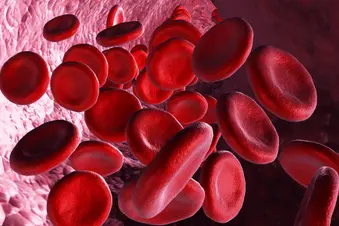
If you have hyperkalemia, you have too much potassium in your blood. The body needs a delicate balance of potassium to help the heart and other muscles work properly. But too much potassium in your blood can lead to dangerous, and possibly deadly, changes in heart rhythm.
Causes
Hyperkalemia can happen if your kidneys don’t work properly and cannot remove potassium from your body or if you take certain medicines.
Kidney disease is the most common cause of hyperkalemia. Your kidneys help control the balance of potassium in your body. If they don’t work well, they can’t filter extra potassium from the blood or remove it from the body. A hormone called aldosterone tells the kidneys when to remove potassium. Diseases that lower the production of this hormone, such as Addison's disease, can lead to hyperkalemia.
Too much potassium in the diet can also contribute to higher levels in your blood, if your kidneys don’t work well or you take certain medicines. Salt substitutes typically contain high amounts of potassium. Foods such as melons, orange juice, and bananas are rich in potassium, too.
Some health problems interfere with how potassium moves out of the body's cells. Sometimes, cells release too much potassium. Releasing too much potassium can result from:
- Breakdown of red blood cells, called hemolysis
- Breakdown of muscle tissue, called rhabdomyolysis
- Burns, trauma, or other tissue injuries
- Uncontrolled diabetes
Conditions that can affect the kidney's ability to remove potassium from the body include:
- Hormonal disorders
- Lupus
- Kidney failure
- Other kidney diseases
Drug-Induced Hyperkalemia
Some medications can cause hyperkalemia. This is particularly true if you have kidney disease or problems with the way your body handles potassium. Also, some drugs may increase the amount of potassium in the body.
Medications that have been linked to hyperkalemia include:
- Blood pressure drugs called angiotensin-converting enzyme (ACE) inhibitors
- Blood pressure drugs called angiotensin-receptor blockers (ARBs)
- Blood pressure drugs called beta-blockers
- Herbal supplements, including milkweed, lily of the valley, Siberian ginseng, Hawthorn berries, or preparations from dried toad skin or venom (Bufo, Chan Su, Senso)
- Heparin, a blood thinner
- Nonsteroidal anti-inflammatory medications (NSAIDs)
- Potassium supplements
- Potassium-sparing diuretics including amiloride (Midamor), spironolactone (Aldactone, Carospir), and triamterene (Dyrenium)
- Antibiotics, including amoxicillin
Symptoms of Hyperkalemia
Potassium helps your nerves fire properly so that they respond to stimulation. Again, this happens via electrical signals that travel from cell to cell.
As part of the nervous system, your brain also needs potassium. The mineral allows brain cells to communicate, both with each other and with cells that are farther away. Changes in potassium levels have been linked to learning, the release of hormones, and metabolism.
Diagnosing Hyperkalemia
Your doctor will examine you and listen to your heartbeat. You will be asked questions about your medical history, diet, and medications.
You will get lab tests to check the level of potassium in your blood and urine. Your doctor will explain your specific results. Many different things can affect your potassium level. If your potassium level appears high, your doctor will likely repeat the blood test.
An electrocardiogram, called an ECG or EKG, maybe done to check for problems with your heart rhythm. This test records your heart's electrical activity.
Not every person with hyperkalemia has changes that can be seen on an ECG.
Treatment for Hyperkalemia
Treatment may include:
- Going on a low-potassium diet
- Stopping or changing meds that are contributing to the hyperkalemia
- Taking medicine to lower the potassium in your body. Water pills (diuretics) remove potassium via the urinary tract.
- Treating your kidney disease, which may include dialysis, which filters potassium from your blood
Other treatments depend on the cause of hyperkalemia.
Some medications work as potassium binders:
- Patiromer (Veltassa)
- Sodium polystyrene sulfonate (Kayexalate)
- Sodium zirconium cyclosilicate (Lokelma)
You take them by mouth to prevent hyperkalemia. Neither should be used in emergencies. If you have a dangerously high potassium level, you will get emergency care including IV medications.
Complications of Hyperkalemia
Hyperkalemia can cause life-threatening heart rhythm changes, or cardiac arrhythmias. It can also cause paralysis and weakness.
Show Sources
Photo Credit: yodiyim / Getty Images
SOURCES:
American Family Physician: "Hyperkalemia."
American Association of Clinical Chemistry: "Potassium: The Test."
Parham, W. Texas Heart Institute Journal, 2006; vol 33: pp 40-47.
National Heart Lung and Blood Institute: "Electrocardiogram."
Mount, D. "Disorders of potassium balance," in Brenner, B.M., ed., Brenner and Rector's The Kidney, 8th ed., Saunders Elsevier, 2008.
Ferri, F. Practice Guide to the Care of the Medical Patient, 8th ed., Mosby, 2010.
Gibbs, M. "Tayal VS. Electrolyte disturbances," in Marx, J, ed. Rosen's Emergency Medicine: Concepts and Clinical Practice, 7th ed., Mosby Elsevier, 2009.